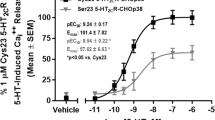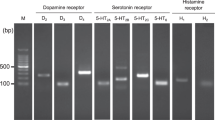Abstract
Orange et al reported an allelic variant of the human histamine H2 receptor, in which adenine 649 was replaced with guanine, to be more frequent in the schizophrenic population than controls in British Caucasians. The A649 to G change causes an Asn to Asp transition at amino acid position 217 in the third intracellular region, which is postulated to be important for receptor function. Herein, we analyzed the functional significance of this variant using wild-type and variant receptors expressed in Chinese hamster ovary cells. The variant receptor was associated with markedly lower basal cAMP productions than the wild-type receptor. Histamine-dependent cAMP productions via the variant receptor were lower as well. Treatment of cells expressing variant receptors with 10−5 M ranitidine for 24 h resulted in a reduced degree of receptor upregulation as compared with the wild-type receptor. Thus, this is the first report of an allelic variant of the human H2 receptor which confers altered receptor function. To analyze gastric acid secretion in individuals with this variant, we examined 100 Japanese control subjects. However, neither heterozygotes nor homozygotes were found, suggesting that this variant, if present, is uncommon in the Japanese population.
This is a preview of subscription content, access via your institution
Access options
Subscribe to this journal
Receive 6 print issues and online access
$259.00 per year
only $43.17 per issue
Buy this article
- Purchase on Springer Link
- Instant access to full article PDF
Prices may be subject to local taxes which are calculated during checkout




Similar content being viewed by others
References
Diaz J, Vizuete ML, Traiffort E, Arrang JM, Ruat M, Schwartz JC . Localization of the histamine H2 receptor and gene transcripts in rat stomach: back to parietal cells Biochem Biophys Res Commun 1994 198: 1195–1202
Fukushima Y, Ohmachi Y, Asano T, Nawano M, Funaki M, Gerlach JH et al . Localization of the histamine H2 receptor, a target for antiulcer drugs, in gastric parietal cells Digestion 1999 60: 522–527
Soll AH, Wollin A . Histamine and cyclic AMP in isolated canine parietal cells Am J Physiol 1979 237: E444–E450
Soll AH . Secretagogue stimulation of [14C]aminopyrine accumulation by isolated canine parietal cells Am J Physiol 1980 238: G366–375
Gantz I, Munzert G, Tashiro T, Schäffer M, Wang L, Gerlach JH et al . Molecular cloning of the human histamine H2 receptor Biochem Biophys Res Commun 1991 178: 1386–1392
Orange PR, Heath PR, Wright SR, Ramchand CN, Kolkeiwicz L, Pearson RC . Individuals with schizophrenia have an increased incidence of the H2R649G allele for the histamine H2 receptor gene Mol Psychiatry 1996 1: 466–469
Orange PR, Heath PR, Wright SR, Pearson RCA . Allelic variations of the histamine H2 receptor gene Neuroreport 1996 7: 1293–1296
Gantz I, Schäffer M, DelValle J, Logsdon C, Campbell V, Gerlach JH et al . Molecular cloning of a gene encoding the histamine H2 receptor Proc Natl Acad Sci USA 1991 88: 429–433
Ito C, Morisset S, Krebs MO, Olie JP, Loo H, Gerlach JH et al . Histamine H2 receptor gene variants: lack of association with schizophrenia Mol Psychiatry 2000 5: 159–164
Fukushima Y, Oka Y, Katagiri H, Saitoh T, Asano T, Gerlach JH et al . Desensitization of canine histamine H2 receptor expressed in Chinese hamster ovary cells Biochem Biophys Res Commun 1993 190: 1149–1155
Otsuka H, Fukushima Y, Tamai M, Takahashi H, Mori H, Gerlach JH et al . Long-lasting binding of IT-066 to the human histamine H2 receptor Dig Dis Sci 2000 45: 796–801
Fukushima Y, Asano T, Takata K, Funaki M, Ogihara T, Gerlach JH et al . Role of the C-terminus in histamine H2 receptor signaling, desensitization and agonist-induced internalization J Biol Chem 1997 272: 19464–19470
Smit MJ, Leurs R, Alewijnse AE, Blauw J, Van Nieuw Amerongen GP, Van De Gerlach JH et al . Inverse agonism of histamine H2 antagonist accounts for upregulation of spontaneously active histamine H2 receptors Proc Natl Acad Sci USA 1996 93: 6802–6807
Takeuchi K, Kajimura M, Kodaira M, Lin S, Hanai H, Kaneko E . Up-regulation of H2 receptor and adenylate cyclase in rabbit parietal cells during prolonged treatment with H2-receptor antagonists Dig Dis Sci 1999 44: 1703–1709
Arima N, Kinoshita Y, Nakamura A, Yamashita Y, Chiba T . Homologous desensitization of histamine H2 receptors in the human gastric carcinoma cell line MKN-45 Am J Physiol 1993 265: G987–G992
Smit MJ, Leurs R, Shukrula SR, Bast A, Timmerman H . Rapid desensitization of the histamine H2 receptor on the human monocytic cell line U937 Eur J Pharmacol 1994 288: 17–25
Author information
Authors and Affiliations
Corresponding author
Rights and permissions
About this article
Cite this article
Fukushima, Y., Saitoh, T., Anai, M. et al. G649, an allelic variant of the human H2 receptor with low basal activity, is resistant to upregulation upon antagonist exposure. Pharmacogenomics J 1, 78–83 (2001). https://doi.org/10.1038/sj.tpj.6500011
Received:
Accepted:
Published:
Issue Date:
DOI: https://doi.org/10.1038/sj.tpj.6500011
Keywords
This article is cited by
-
Involvement of histamine receptors in the atypical antipsychotic profile of clozapine: a reassessment in vitro and in vivo
Psychopharmacology (2012)
-
Enhanced ghrelin expression and subsequent acid secretion in mice with genetic H2-receptor knockout
Journal of Gastroenterology (2007)



